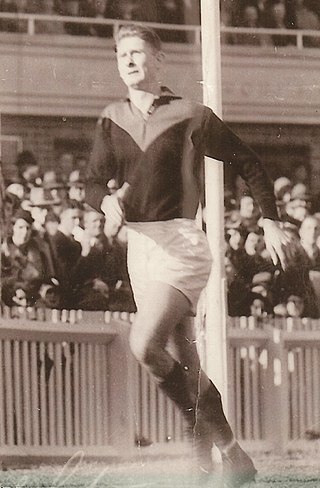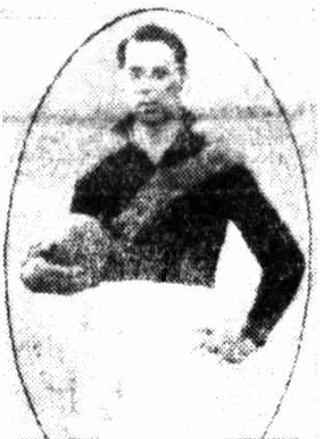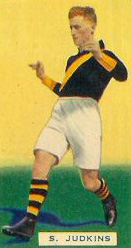Related Research Articles

The Richmond Football Club, nicknamed the Tigers, is an Australian rules football team playing in the Australian Football League (AFL). Between its inception in the Melbourne suburb of Richmond in 1885 and 1907, the club competed in the Victorian Football Association (VFA), winning two premierships. Richmond joined the Victorian Football League in 1908 and has since won 13 premierships, most recently in 2020.
Keith Southby Greig is a former Australian rules footballer who played for the North Melbourne Football Club in the Victorian Football League (VFL).

Norman Walter Smith was an Australian rules football player and coach in the Victorian Football League (VFL). After more than 200 games as a player with Melbourne and Fitzroy, Smith began a twenty-year coaching career, including a fifteen-year stint at Melbourne.

Thomas Stanley Raymond Hafey was an Australian rules footballer who played for the Richmond Football Club in the Victorian Football League (VFL). He then became one of the VFL's longest-serving and most successful coaches, guiding Richmond to four VFL premierships before also having stints at Collingwood, Geelong and finally Sydney.
Hafey was an inaugural inductee into the Australian Football Hall of Fame in 1996, named coach of Richmond's team of the century in 1998, and given the AFL Coaches Association "Coaching Legend Award" in 2011. He was renowned for his fitness and toughness even in his elderly years when he would still run rings around his juniors. He would do over 700 push-ups and crunches a day every day since he started playing in the VFL.
Ian Harlow Stewart is a former Australian rules footballer who played for the St. Kilda Football Club and Richmond Football Club in the Victorian Football League (VFL). He later coached South Melbourne and Carlton before returning to St. Kilda to serve as general manager.
Royce Desmond Hart is a former Australian rules footballer who played for the Richmond Football Club in the Victorian Football League (VFL).
Francis William Bourke is a former Australian rules footballer and coach who represented Richmond in the Victorian Football League (VFL) between 1967 and 1981, and coached the club in 1982 and 1983.

Victor Charles Thorp was an Australian rules footballer for the Richmond Football Club in the Victorian Football League between 1910 and 1925.

Stan Judkins was an Australian rules footballer who played for the Richmond Football Club in the Victorian Football League between 1928 and 1936. He became the first Richmond player to win the game's most prestigious award, the Brownlow Medal.

The 1954 VFL season was the 58th season of the Victorian Football League (VFL), the highest level senior Australian rules football competition in Victoria. The season featured twelve clubs, ran from 17 April until 25 September, and comprised an 18-game home-and-away season followed by a finals series featuring the top four clubs.
The 1965 VFL season was the 69th season of the Victorian Football League (VFL), the highest level senior Australian rules football competition in Victoria. The season featured twelve clubs, ran from 17 April until 25 September, and comprised an 18-game home-and-away season followed by a finals series featuring the top four clubs.

The 1936 VFL season was the 40th season of the Victorian Football League (VFL), the highest level senior Australian rules football competition in Victoria. The season featured twelve clubs, ran from 2 May until 3 October, and comprised an 18-game home-and-away season followed by a finals series featuring the top four clubs.
The 1941 VFL season was the 45th season of the Victorian Football League (VFL), the highest level senior Australian rules football competition in Victoria. The season featured twelve clubs, ran from 26 April until 27 September, and comprised an 18-game home-and-away season followed by a finals series featuring the top four clubs.
The 1968 VFL season was the 72nd season of the Victorian Football League (VFL), the highest level senior Australian rules football competition in Victoria. The season featured twelve clubs, ran from 15 April until 28 September, and comprised a 20-game home-and-away season followed by a finals series featuring the top four clubs.
The 1971 VFL season was the 75th season of the Victorian Football League (VFL), the highest level senior Australian rules football competition in Victoria. The season featured twelve clubs, ran from 3 April until 25 September, and comprised a 22-game home-and-away season followed by a finals series featuring the top four clubs.
The 1972 VFL season was the 76th season of the Victorian Football League (VFL), the highest level senior Australian rules football competition in Victoria. The season featured twelve clubs, ran from 1 April until 7 October, and comprised a 22-game home-and-away season followed by a finals series featuring the top five clubs – an increase from the four clubs which had contested the finals in previous years.
The 1973 VFL season was the 77th season of the Victorian Football League (VFL), the highest level senior Australian rules football competition in Victoria. The season featured twelve clubs, ran from 7 April until 29 September, and comprised a 22-game home-and-away season followed by a finals series featuring the top five clubs.
Brent Tasman Crosswell is a former Australian rules footballer who played for the Carlton Football Club, North Melbourne Football Club and Melbourne Football Club in the Victorian Football League (VFL).
The 1980 VFL Grand Final was an Australian rules football game contested between the Richmond Football Club and Collingwood Football Club, held at the Melbourne Cricket Ground in Melbourne on 27 September 1980. It was the 84th annual Grand Final of the Victorian Football League, staged to determine the premiers for the 1980 VFL season. The match, attended by 113,461 spectators, was won by Richmond by a margin of 81 points, marking that club's 10th VFL/AFL premiership victory, and they would not win the premiership again until 2017.
The 1974 VFL Grand Final was an Australian rules football game contested between the Richmond Football Club and North Melbourne Football Club, held at the Melbourne Cricket Ground in Melbourne on 28 September 1974. It was the 77th annual grand final of the Victorian Football League, staged to determine the premiers for the 1974 VFL season. The match, attended 113,839 spectators, was won by Richmond by a margin of 41 points, marking that club's ninth VFL/AFL premiership victory. The game itself is also notable for being the first grand final to be videotaped and telecast in colour.
References
- ↑ Atkinson, Graeme (1989). 3AW Book of Footy Records. South Melbourne: Magistra Publishing Company Pty Ltd. p. 278. ISBN 1863210091..
- ↑ "Hall of Fame". Richmond FC Official Site. Australian Football League . Retrieved 3 June 2019.
- ↑ Greenberg, Tony (15 March 2019). "Roger Dean honoured as Tiger 'Immortal'". Richmond FC Official Site. Australian Football League . Retrieved 4 June 2019.